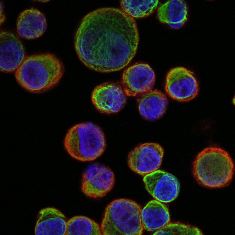Proteins in circulating tumour cells can predict response to chemotherapy
19 December 2013
Scientists from the University of Granada have demonstrated, for the first time, that the presence of specific proteins occurring in circulating tumour cells (CTCs) in blood can predict with great precision a patient's response to chemotherapy.
These proteins, which make patients particularly sensitive to specific drugs, can also help predict the associated secondary effects patients may suffer. CTCs are the origin of cancer metastasis, which is the cause of more than 9 out of 10 deaths from cancer.
The scientists, from the Circulating Tumour Cells and Metastasis research group of GENYO (Centre for Genomics and Oncological Research: Pfizer/University of Granada/Andalusian Regional Govt.) received an award at the 9th International Symposium on Minimal Residual Cancer for their study on using this technique with patients with advanced cancer of the colon.

Circulating tumour cells
The patients, studied in the Oncology Unit of the Clinical Hospital of Granada and the Hospital of Motril, underwent a standard treatment for the cancer, which includes chemotherapy and a specific monoclonal antibody that reduces the vascularisation of the tumour. The study was carried out in collaboration with the Roche Farma laboratory.
This test on CTCs is one of eight studies the Granada research group is currently carrying out on patients affected by various particularly relevant pathologies in oncology, such as breast cancer, lung cancer, peritoneal carcinomatosis or prostate cancer. These studies have been funded by the Andalusian Regional Government’s Health Council, the University of Granada and the pharmaceutical sector. The work of this GENYO group has now caught the attention of the pharmaceutical industry.